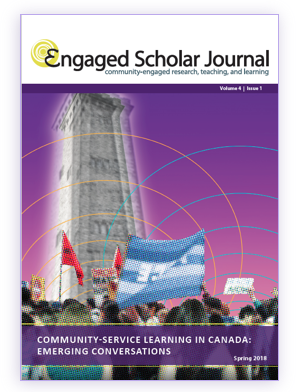Community-University Engagement: Case Study of a Partnership on Coast Salish Territory in British Columbia
DOI:
https://doi.org/10.15402/esj.v4i1.313Keywords:
community engagement, decolonization, community-university engagement, Community as Teacher, relationship-buildingAbstract
In the context of expanding community engagement efforts by universities and growing awareness of the past and current impacts of settler-colonialism in Canada, this study explores one Indigenous-settler, community-university partnership. Building on a framework of community-university engagement and decolonization, this case study explores a partnership between Fraser Valley Aboriginal Children and Family Services Society (Xyolhemeylh) and the Division of Health Care Communication at the University of British Columbia (UBC-DHCC). This partnership, called the “Community as Teacher” program, began in 2006 and engages groups of UBC health professional students in three-day cultural summer camps. This qualitative case study draws on analysis of program documents and interviews with Xyolhemeylh and UBC-DHCC participants. The findings of the study are framed within “Four Rs”—relevance, risk-taking, respect, and relationship-building—which extend existing frameworks of Indigenous community-university engagement (Butin, 2010; Kirkness & Barnhardt, 1991). Committed to a foundation of mutual relevance to their missions, both community and university partners undertook risk-taking, based on their respective contexts, in establishing and investing in the relationship. Respect, expressed as working “in a good way,” likewise formed the basis for interpersonal relationship-building. By outlining the findings in relation to these four themes, this study provides a potential framework for practitioners and researchers in Indigenous-university partnerships
Downloads
Published
How to Cite
Issue
Section
License
Authors who publish with this journal agree to the following terms:
- Authors retain copyright and grant the journal right of first publication with the work simultaneously licensed under a Creative Commons Attribution License CC BY 4.0 that allows others to share the work with an acknowledgement of the work's authorship and initial publication in this journal.
- Authors are able to enter separate, additional contractual agreements for the non-exclusive distribution of the journal's published version of the work (e.g., post it to an institutional repository or publish it in a book), with an acknowledgement of its initial publication in this journal.
- Authors are permitted to post their work online (e.g., in an institutional repository or on their website) after the publication of their work in the Engaged Scholar Journal.
- Please note that while every opportunity will be taken to ensure author participation in the editing process, due to time constraints final copyediting changes may be made before publication to ensure APA adherence throughout all submissions.




